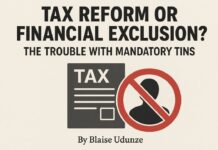By NIyi JACOBS
The International Monetary Fund (IMF) has given a strong nod to Nigeria’s recent economic reforms, hailing them as credible and effective steps toward stabilising Africa’s largest economy. In its 2025 Article IV Consultation, the Fund praised Nigeria’s authorities for enacting bold, politically difficult reforms that have begun to reverse years of macroeconomic instability.
At the heart of Nigeria’s policy reset is the reassertion of Central Bank independence. The Central Bank of Nigeria (CBN), under Governor Olayemi Cardoso, has drastically curtailed its use of the controversial “Ways and Means” facility—a move the IMF described as ending deficit monetisation. Advances under the facility have dropped by nearly 90% as of April 2025.
This shift has strengthened the institutional framework for inflation targeting. Headline inflation, which had peaked above 40%, declined sharply to 22.9% in May 2025. The IMF noted the CBN’s tight monetary policy as appropriate, urging continued restraint until disinflation is firmly entrenched.
Foreign Exchange Overhaul Gets High Marks
The IMF also praised Nigeria’s sweeping foreign exchange (FX) market reforms. The central bank dismantled the multiple exchange rate windows and introduced a market-driven, “willing-buyer, willing-seller” system supported by the new B-Match trading platform. The reforms have brought transparency, boosted FX inflows to $6.9 billion in Q1 2025, and pushed external reserves to $40.9 billion by year-end 2024.
The FX premium—the gap between official and parallel market rates—has narrowed dramatically from over 60% to under 3%. These results signal renewed investor confidence and liquidity in the system, prompting Nigeria’s return to the Eurobond market in January 2025 after a four-year absence.
Banking Sector Recapitalisation Underway
The IMF welcomed Nigeria’s ongoing recapitalisation of the banking sector, which aims to significantly raise minimum capital requirements by March 2026. The move is designed to ensure banks are well-capitalised to absorb shocks and finance long-term growth toward a $1 trillion economy.
The CBN is also pushing forward with initiatives to improve financial inclusion. Through targeted programmes such as the Women’s Financial Inclusion Initiative (Wi-Fi), the bank is expanding access to underserved groups, especially women and rural populations.
Stronger Institutions, But Risks Remain
The Fund noted Nigeria’s progress in strengthening anti-money laundering (AML) and counter-terrorism financing (CFT) regulations, while encouraging the country to resolve remaining gaps in order to exit the FATF grey list.
Still, the IMF warned of lingering vulnerabilities. Despite recent disinflation, inflation remains high. Structural challenges such as power shortages, insecurity, red tape, and low agricultural productivity persist. The Fund urged Nigeria to prioritise investment in infrastructure, education, and health, and to improve climate resilience.
Nonetheless, the Fund emphasised that the current reforms “should help establish a strong foundation for sustained and inclusive growth.” With fiscal and monetary tightening, exchange rate unification, and increased FX transparency, Nigeria is regaining macroeconomic balance and investor trust.
Cardoso: A Vote of Confidence
Reacting to the IMF assessment, CBN Governor Olayemi Cardoso said:
“At a time of global uncertainty, this report reaffirms that responsible, forward-looking policy choices matter. It shows that Nigeria is regaining credibility, anchoring expectations, and laying the foundation for inclusive, long-term growth. It is both a call to stay the course and a reminder that resilience requires continued discipline and vision.”
As Nigeria navigates a complex global environment, the IMF urged “nimble policymaking” and stronger coordination between fiscal and monetary authorities to sustain the current momentum.














